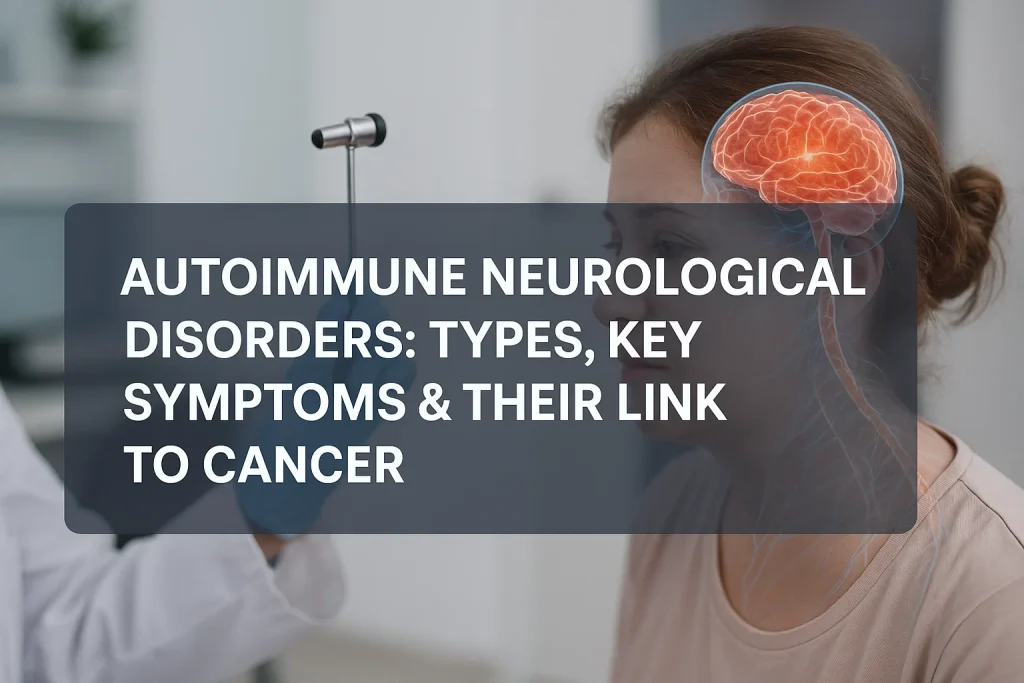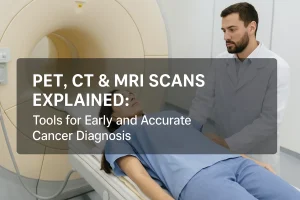
Autoimmune Neurological Disorders: Types, Key Symptoms & Their Link to Cancer
The human body has an incredible defense system, our immune system, that helps us fight infections and remain healthy. But sometimes, this system malfunctions. Instead of protecting us, it begins attacking our cells. When this occurs in the nervous system, it results in a group of disorders called autoimmune neurological disorders. These conditions are rare but serious, and their link to certain cancers has become an important area of research. Understanding these disorders is crucial—not only for patients and families but also for healthcare professionals aiming for early diagnosis and adequate treatment.
Understanding the Nervous System
What is the role of the central and peripheral nervous systems in our body?
Our nervous system includes the central nervous system (CNS) and peripheral nervous system (PNS) and is vital for maintaining coordination throughout the entire body. Disorders affecting it can often lead to autoimmune neurological disorders.
What is the role of nerves in Body function?
Movement, feeling, and even internal functions like breathing and digestion are all controlled by nerves. Therefore, when an immune response damages them, the results can have profound effects, involving everything from paralysis and cognitive changes to muscle weakness.
What Are Autoimmune Neurological Disorders?
When parts of the nervous system are mistakenly attacked by the immune system, which typically protects the body from infections, autoimmune neurological disorders result. These immune attacks can damage:
- Central nervous system (CNS): includes brain and spinal cord
- Peripheral nervous system (PNS): reaches the nerves outside the brain and spinal cord
- Neuromuscular junctions: These connect nerves with muscles
The result can vary from mild symptoms like fatigue or numbness to serious issues such as disability, paralysis, or even death if left untreated.
Top Five Types of Autoimmune Disorders You Must Know.
1. Multiple Sclerosis (MS): MS is a chronic autoimmune disorder that affects the Central Nervous System where immune cells attack the myelin sheath (providing insulation to nerve fibers). This disturbs nerve coordination between the brain and the rest of the body.
Multiple sclerosis symptoms:
- Vision problems (blurred or double vision)
- Muscle weakness or spasticity
- Tingling or numbness
- Difficulty walking or balancing
- Fatigue
- Cognitive impairment
Cancer Link: Not directly linked, but treatment including immunosuppressive therapies may affect the body’s ability to identify and destroy cancerous cells, thereby slightly increasing the risk of cancer over time.
2. Myasthenia Gravis (MG): affecting Neuromuscular junction MG occurs when antibodies block or destroy the acetylcholine receptors activity at the neuromuscular junction, leading to muscle weakness and nerve dysfunction.
Myasthenia Gravis Symptoms:
- Drooping eyelids (ptosis)
- Dual vision
- Difficulty swallowing or speaking
- Muscle weakness that declines with activity
Cancer Link: Approximately 15-16% of MG patients are Found associated with thymoma (a tumor of the thymus gland). Early diagnosis and screening of cancer are crucial.
3. Autoimmune Encephalitis: leading to inflammation of the brain caused by an autoimmune response, often triggered by an infection or underlying cancer, affecting CNS
Key Symptoms of Autoimmune Encephalitis:
- Loss of memory (brain impairment)
- Seizures
- Psychosis or hallucinations
- Personality changes
- Confusion and disorientation
Cancer Link: Strongly linked to paraneoplastic syndromes, especially in ovarian, breast, lung, or testicular cancers. Early detection of the tumor can help resolve neurological symptoms.
4. Neuromyelitis Optica Spectrum Disorder (NMOSD): Aggressive, Causes inflammation and demyelination of the optic nerves and spinal cord. It’s often confused with MS(multiple sclerosis)
Key Symptoms:
- Vision loss
- Extreme limb weakness
- Nausea and vomiting
- Bladder and bowel dysfunction
Cancer Link: Rare, but diagnosis is important because the presence of a cancer like lung adenocarcinoma may cause or worsen the autoimmune process.
5. Guillain-Barré Syndrome (GBS): GBS is an acute autoimmune disease in which the immune system targets peripheral nerves., often initiated by an infection or, rarely, cancer.
Guillain-Barré Syndrome Key Symptoms:
- Rapid-onset muscle weakness
- paralysis that starts in the legs
- tingling in the feet and hands
- In extreme situations, breathing difficulties
Cancer Link: seen in certain patients with lung cancer and lymphoma, particularly as a paraneoplastic manifestation.
When to See a Doctor
It’s essential to get a neurological evaluation if symptoms worsen quickly or persist. In some cases, damage can be slowed or even reversed with immediate action.
Paraneoplastic Neurological Syndromes (PNS) and their link to cancer
What Are Paraneoplastic Neurological Syndromes (PNS)?
PNS is a collection of rare diseases that occur when an individual’s immune system mistakenly targets parts of the nervous system in response to a tumor. PNS causes indirect neurological damage as compared with metastatic disease, which occurs when cancer spreads to the brain or spinal cord.
Common Cancers Associated with PNS:
- Small-cell lung cancer (SCLC)
- Breast cancer
- Ovarian cancer
- Testicular tumors
- Blood disorders like Lymphoma and leukemia
Neurological Disorders Linked to PNS:
- Limbic encephalitis
- Subacute cerebellar degeneration
- Opsoclonus-myoclonus syndrome
- Lambert-Eaton Myasthenic Syndrome (LEMS)
Diagnosis and Treatment
How Autoimmune Neurological Disorders are diagnosed?
Early detection of the condition is key to controlling irreversible nerve damage. Doctors may use:
- MRI scans to detect inflammation, demyelination, or lesions
- Lumbar puncture to analyse cerebrospinal fluid
- Blood tests for autoantibodies (e.g., anti-NMDA receptor, AQP4, ANA)
- Electromyography (EMG) for nerve-muscle communication
- PET-CT or CT scans to look for hidden tumors in suspected PNS
How Are Autoimmune Neurological Disorders Treated?
Treatment usually involves both immunosuppression and managing the underlying cause, if present.
Common Treatment Methods:
- Corticosteroids (e.g., methylprednisolone)
- Plasma exchange (plasmapheresis) removes harmful antibodies, and Intravenous immunoglobulin (IVIG) delivers healthier antibodies in the blood.
- Immunosuppressants (azathioprine, rituximab)
- Tumor removal (surgery) or chemotherapy (uses drugs to kill cancer) in cancer-linked cases
- Physical Therapy and Supportive Care help recover and improve quality of life
Living with Autoimmune Neurological Disorders
It can be emotionally and mentally draining to live with a chronic neurological condition. People often benefit from
- Therapy or counseling to deal with emotions.
- Mindful practices such as deep breathing or meditation.
- Routine building, which provides a sense of control.
Diet and Lifestyle Modification
- Eat Anti-inflammatory foods like leafy greens, berries, and fatty fish.
- Avoiding highly processed foods and added sugars.
- Keep yourself hydrated and get good sleep.
Prevention
It is not possible to completely prevent these conditions, but you can lower and manage the condition through a healthy lifestyle, controlling triggers, managing stress, and undergoing regular health checkups.
- Do Regular Exercise as it helps manage symptoms and boost overall health.
- Aim for good sleep, as it supports immune function and promotes overall well-being.
- Practices like mindfulness, meditation, or yoga can lower stress and protect immune health and are helpful in Stress management.
- While it can’t cure autoimmune diseases, an anti-inflammatory diet with leafy greens, berries, and fatty fish can help manage symptoms and support immune and nerve health.
- Minimizing exposure to cigarette smoke and harmful chemicals may be beneficial.
Conclusion
Autoimmune neurological disorders are a complicated and often mistaken group of conditions. From rare paraneoplastic syndromes to multiple sclerosis, create challenges for both patients and doctors. Early detection of the symptoms and knowledge of potential links to cancer can significantly impact results.
For those affected, the future appears brighter than ever thanks to new treatment options, increased awareness, and ongoing research. If you or a loved one are experiencing unexplained neurological symptoms, don’t wait—seek medical advice and get tested.
FAQs
What causes autoimmune neurological disorders?
When the immune system mistakenly targets the brain, spinal cord, or nerves, it can lead to this condition, sometimes infections, genetic factors, or hidden cancers can also trigger them.
Can autoimmune disorders lead to cancer?
No, it doesn’t directly cause cancer; however, some types are linked to hidden tumors, particularly paraneoplastic neurological syndromes.
Are autoimmune neurological disorders curable?
Although it is usually incurable, immunosuppressive therapy and the treatment of any related cancer can frequently control or improve it.
Is there a test for autoimmune brain diseases?
Antibody panels, MRIs, lumbar punctures, and sometimes EEGs are used to diagnose autoimmune activity in the brain.
What should I do if I suspect a link between my symptoms and cancer?
See a neurologist and ask for a cancer screening and antibody panel. Both cancer and neurological outcomes are improved by early testing.
- Cyst vs Tumor: Key Differences, Symptoms, and Diagnosis
- High Polymorphs in Blood: Causes, Symptoms & Health Risks Explained





